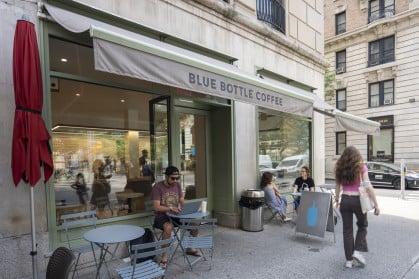How to choose a commercial tenant for your NYC co-op building
- Commercial leasing is on an upswing and tenants increasingly call the shots
- 'Think of your building as a brand' and consider what businesses compliment it

Blue Bottle Coffee on the ground floor of a large co-op building on the Upper West Side.
iStock
Maybe you’re thinking of joining your co-op or condo board because you want to have a say in choosing a business for your building’s ground-floor commercial space. Before you start dreaming of the perfect addition to your New York City building—like a flower shop or maybe a quiet café—there are some important things to know.
The first is that you may not actually have a say at all, because much depends on what type of residential building you are in. If you live in a condo building, ownership of the commercial space is likely retained by the building’s sponsor, or a unit holder, and tenants are not subject to the board’s approval. If you live in a co-op, where the commercial space is usually available as a sublease, you may have some influence.
Here's more on what you need to know about filling a commercial space in a NYC co-op building.
[Editor's note: This article was originally published in April. We are presenting it again as part of our summer Best of Brick week.]
What is the process for finding a commercial tenant?
If you’re not already familiar with your co-op building’s bylaws, you will want to start there. Those will dictate what type of business is permitted. Some locations are limited to community-oriented use—like drug stores, doctor’s offices, religious institutions, or schools.
And you’ll need to brush up on your neighborhood’s zoning restrictions, says Jonharold Cicero, a real estate attorney at DL Partners, which represents condo and co-op buildings throughout NYC (and is a Brick sponsor).
Next your plan should be to consult with a commercial broker who will be the one to find the tenant.
Once you start receiving applications, the process is similar to a residential co-op application process, with some important differences.
You want to make sure the business’s finances are in order and that there’s a guarantor who has enough assets, Cicero says.
“Fair Housing rules do not come into play but regardless, you can’t be discriminatory,” he adds.
You’ll also be considering the hours of operation, the lease term, security deposit, and annual rent increases.
You want to make sure the hours of operation are clear. For example, if the business is a coffee shop that is only open during the day as opposed to being open in the evening as an after-hours lounge.
Cicero recommends bringing in an attorney early in the process to help negotiate a brokerage agreement and prepare the deal sheet.
“In a typical co-op deal, the contract is contingent on passing an interview and getting approved for financing,” he says. With commercial leasing, “you’re not signing anything until you see the financials.”
Who pays for the buildout?
It is a tenant market, says real estate attorney Michael Nerenberg, senior partner at Borah, Goldstein, Altschuler, Nahins & Goidel. His practice area includes commercial lease agreements.
That means retail tenants are calling the shots. While a board can require a departing tenant to empty the space out, a new tenant may demand the board pay for the cost of the buildout—and many boards these days will comply, he says.
“There’s such a push to fill the space,” he says.
But unlike the residential market, it’s never a good idea to renovate a vacant retail space in order to attract a tenant.
“You run the risk of being asked to renovate again,” he says.
The state of retail is very different today than a few years ago during the pandemic.
“By and large people are back to the office but not every day of the week. Having more people on the street is important for retail, and NYC is one of the most walkable cities in the U.S.” he says. “We’ve reached the point where retail tenants are more prone to take long-term leases.”
He advises taking advantage of experienced retail brokers, even if you possess legal or accounting experience. Due diligence is critical, including reviewing the business’s profit and loss statement, and that’s not likely to be something you do on a full-time basis.
Most buildings will replace one commercial tenant with another from the same industry because it makes sense in terms of zoning and the needs of the business. For example, one restaurant will likely be replaced by another in a neighborhood where there’s good foot traffic and because the space has been built out to accommodate an eatery.
Where a board can run into a headache is if a space has been built out in a very specific way, say for a particular restaurant chain, and then vacated.
Real estate attorney Christopher Tarnok, a partner at DL Partners, shared an anecdote about a building that was in negotiations with a medical provider for their commercial space.
“During negotiations they realized a specialized x-ray machine was needed, and there was only sheet rock between the office and the apartment above,” Tarnok says. This made the buildout both more complicated and expensive because the room with the equipment had to be encapsulated and inspected. “But it was absolutely mandatory,” he says.
‘Think of your building as a brand’
Trever Gallina, vice president of retail property sales at Marcus & Millichap, has some creative suggestions for co-op board members who have some leeway in choosing a commercial tenant.
Think of your building as a brand, he suggests, and then think of what types of businesses compliment it.
“You want to protect the integrity of the brand,” he says. A mismatched business sends a bad message to owners and buyers.
A client, Élan Flowers, made a great presentation to a co-op building that attracts a lot of creative types. “It was a great fit,” he says. If you want to make a similar match, “you want to make sure the values of the business are in sync with the values of the building,” he says.
He also recommends visiting the business in its current location to see how they maintain the interior and exterior and “trust your gut” about whether the business will be a good neighbor.
He suggests board members consider the following questions during their expedition:
- Is the storefront clean?
- Does it have a good vibe?
- Do the business owners take merchandising seriously?
- How are the salespeople acting?”
And finally: “Look at customers in the store because they will be in the building,” he says.
You Might Also Like
Sign Up for our Boards & Buildings Newsletter (Coming Soon!)
Thank you for your interest in our newsletter. You have been successfully added to our mailing list and will receive it when it becomes available.


















